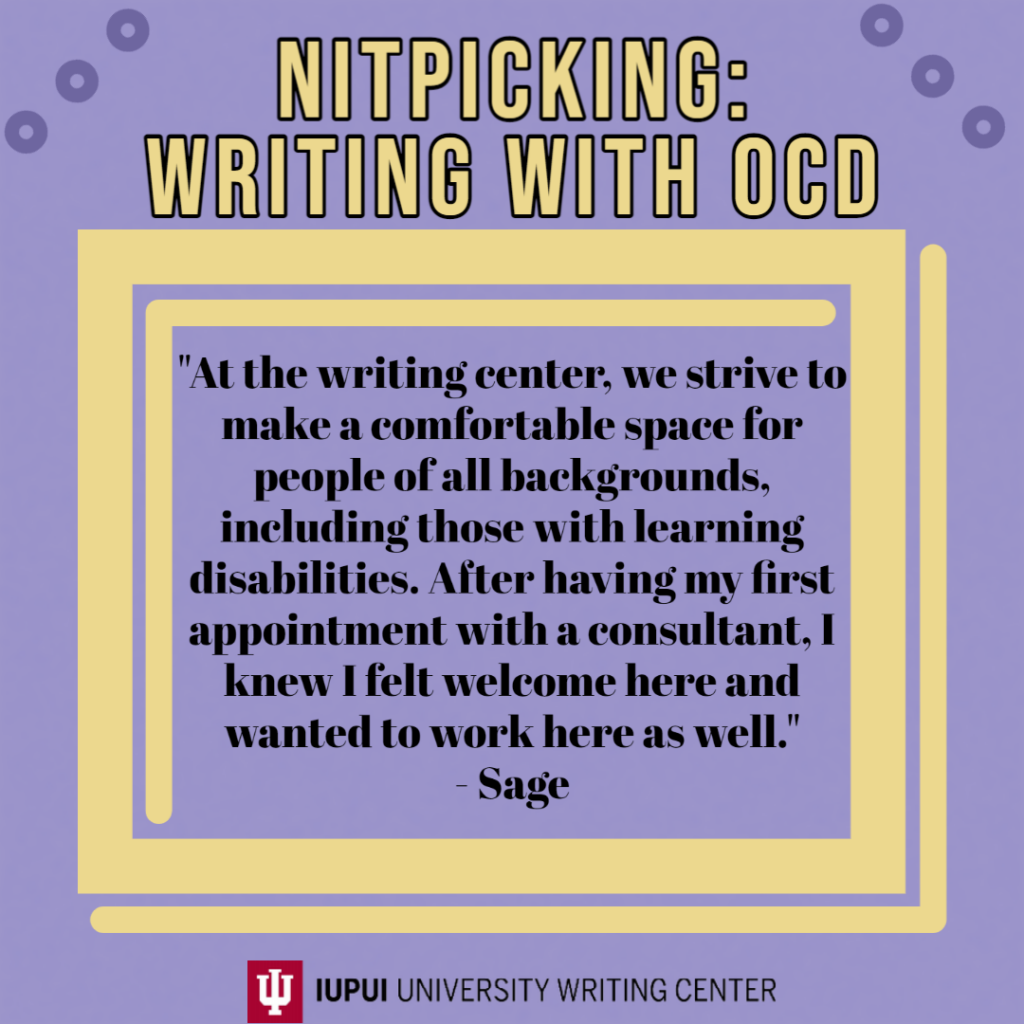by Sage Justice

Obsessive Compulsive Disorder (OCD) can affect writers much in the same ways as a learning disability. I was diagnosed with OCD along with severe anxiety in elementary school when my repetitive compulsions became so disturbing to my school life that I was falling behind the other kids my age. When reading, I compulsively re-read every passage three times, leading to a much slower reading time than others. I had to read every word on every page as well, from copyright statements to the header at the top of the page. When first learning to read, I could only read out loud, which was disruptive to my classmates during silent reading time. These are just a few of the ways that my OCD manifested and affected my learning from a young age. Despite the difficulties I faced in learning, I was an avid reader, and a lover of stories and poetry. I always wanted to be a writer.
At the writing center, we strive to make a comfortable space for people of all backgrounds, including those with learning disabilities. After having my first appointment with a consultant, I knew I felt welcome here and wanted to work here as well. My OCD affects my learning in such a way that typical approaches to revising don’t always help, and finding the right approach to revision was the most important part of my journey in writing. Revision is an integral step in the writing process, which I had been neglecting for the longest time before coming to college and realizing its importance. I used to just turn in first drafts, refusing to engage with my writing more in-depth. After all, I had already been obsessing over every word I had just typed.
So how do you get over it? How do you stop editing in the middle of your sentences and allow your writing to flow out of you? Then how do you revise it without getting hung up on every word? What helped me was taking a less traditional approach to writing that allowed me to get words out on the page. It seems I had tried everything until I got to this point, with nothing working for me. I had to find my voice, and in order to do that, I had to write the way I speak in my head. My head is a messy, confusing place with OCD. In therapy, I learned to lean into my compulsions and intrusive thoughts; to explore them, turn them inside-out, and back again. I decided to write everything that came into my head in a blank document and allow myself to repeat words and phrases as much as I needed to with only one rule: don’t delete anything.
It may seem counterproductive to eliminate the backspace button from your writing. However, for my OCD brain, it helped me to make sense of the thoughts rushing through my head. I would type in long, run-on sentences with some fragments and repeated phrases, and this allowed me to get over my fear of starting and just word-vomit onto the page. I also refused to let any thought go untyped. Anything that came into my head during the writing process went straight to the page, whether I thought it was good or not. At some point, I ended up with something that was like a paper, but was more of a documentation of my racing thoughts. By keeping all of it in the first draft, you are telling yourself that every thought you have is worthy of being written, every sentence has potential. As a consultant now, this is what I tell my writers to do: write down every single thing that comes into your head during the brainstorming process, even if it’s about how much you don’t want to write. Eventually you’ll fall into actual coherent sentences that take off into a whole paper. For those who have trouble just starting and hate outlines as much as I do, this is a way to get your ideas out onto the page without passing judgement on your own writing before it’s even started.
Write loose, revise tight. This is what I learned from my study of poetry, and it can apply to all kinds of other writing as well. Revision was easier now that it was more obvious what needed to stay and what could be changed. Over time, it became a sort of routine. I would write out everything that came to mind in a document, then get to work on the individual sentences. Writing everything that popped into my head reinforced the idea that every word was worthy of the page, every sentence had some sort of notability to it, and I could write in my own voice without trying to force it to conform to some academic standard version of English I was told to write in for so long. Thus, I stopped being overly critical of everything I wrote and saw it through a completely different lens. Before using this technique, I was hung up on every word I wrote and obsessively deleting and retyping for hours. Now I have the freedom and ability to write without the paralyzing fear of imperfection.

